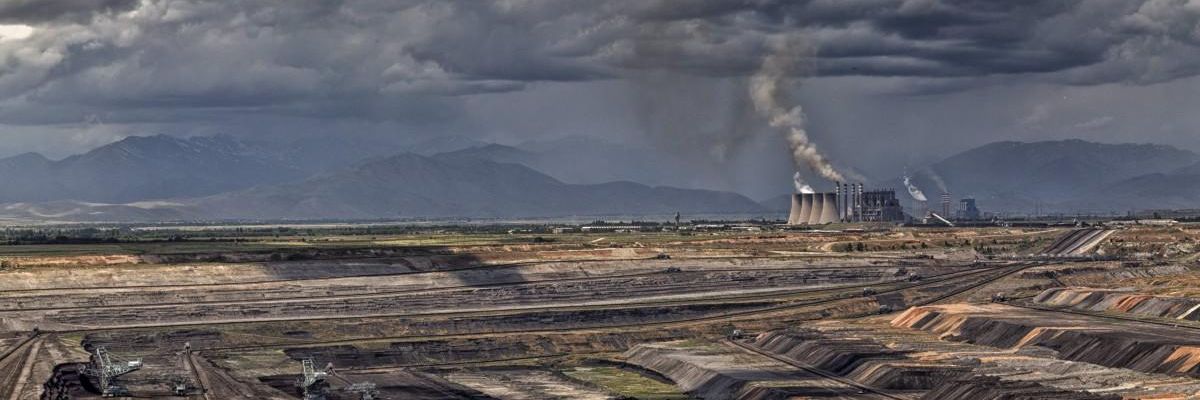Turkey is emerging as one of the biggest coal battlegrounds in the world, currently there are 71 coal projects at various stages of planning and permission. The Turkish government is pursuing an energy strategy that involves a rapid expansion of coal-fired generation, to meet the needs of a growing economy and reduce the country's dependence on imported gas. But this rush to exploit coal will cost our country dearly in terms of our population's health, our environment and also our financial well-being.
Turkey currently relies heavily on gas-fired generation and has enormous potential for solar and wind power, despite this the government is looking to diversify towards coal justifying this choice by citing security of energy supply. This official plan would involve a 145% increase in coal-fired generation and a 94% jump in power sector emissions.
These decisions are being made while we know that the fossil fuel industry is pushing our climate to the brink faster than anyone expected. 2015 was the hottest year ever recorded and the impacts of climate change are already hitting communities around the world - including Turkey, as NASA's recent research showed that the eastern part of the Mediterranean Region is facing its worst drought in last 900 years. The need to act on climate change has never been more urgent.
"This rush to exploit coal will cost our country dearly in terms of our population's health, our environment and also our financial well-being."Turkey's global greenhouse gas (GHG) emissions are increasing rapidly and the growing use of coal is one of the main contributors. In the recent "Financing Coal Report" it says that if the government commissions the plants included in the current plan their carbon dioxide emissions are expected to reach 200 million tons, compared to 21.5 million tons in 1990 and 68.7 million tons in 2012.
It seems crazy that our government would continue to pursue all 71 projects after signing up to the Paris Climate agreement where commitments by governments agreed to staying "well below 2C above pre industrial levels" and a promise to "pursue efforts" to keep it below 1.5C.
If the climate prerogative is not enough to motivate our government, this is also affecting the health of our population. Air pollution is a major issue with coal fired power plants. According to the "Air Pollution Report" published 2015 by the Chamber of Environmental Engineers it is one of the most significant public health issues in Turkey.
Another report by Greenpeace states that the acid gas, soot and dust emissions from coal are the biggest contributors to microscopic particulate pollution that penetrates deep into the lungs and into the bloodstream. Thousands of kilograms of toxic metals such as mercury, lead, arsenic and cadmium are spewed out of the stacks, contributing to cancer risk and harming children's development.
According to the Health and Environment Alliance (HEAL), there is a substantial economic burden related to the air pollution from the 19 coal-fired power plants that were in operation in 2012 in Turkey; it calculated that the negative impacts created health costs of up to EUR 3.6 billion a year.
It is not only the health costs that are a financial burden on our society but also all the subsidies that our government gives to this polluting industry in our name. The Turkish government provides an estimated US$300 million to US$1.6 billion (TRY 683 million to TRY 3.6 billion) per year in fossil fuel producer subsidies.
Incredibly the government is also spending money trying to find more of this damaging fuel. In 2013, Turkey provided some US$500 million in public funding specifically for fossil fuel exploration. The coal exploration program has increased coal reserves by over 50 percent since 2005, opening up 5.8 billion tons of new coal to be mined. Exposing our environment and health to even more dangerous pollutants.
"The need to intensify our campaign through peaceful civil disobedience stems from the reality that so much remains to be done in order to lessen the effects of the climate crisis."
Turkey's power market is at a crossroads that could see the country locked into a carbon-intensive energy system or if we speak up now we can embrace renewables. A recent study from Bloomberg New Energy Finance states that Turkey's greenhouse gases from the power sector can be stabilized by 2020 if a renewable pathway is implemented. The study found that we can meet most of the expected growth in power demand in the next decade from wind and solar.
Fighting climate change requires the courage to confront polluters where they think they are most powerful. Thankfully the climate justice movement has grown from strength to strength in recent years. Here in Turkey we have over 80 civil society organisations working under the coalition Fosil Yakit Karsiti Inisiyatif (The Initiative Against Fossil Fuels). Under this united banner, we are all taking action to make sure that more people know of these issues.
Along with more community leaders, we will head a mass action in Aliaga on 15 May at a coal waste site to call for a stop to four fossil fuel plant projects in the surrounding area. This action will unite several fights against individual coal plants into a unified stance against the current Turkish government's plan to dramatically expand the use of coal in the country. During Break Free people in Turkey and the whole world are rising up to make sure more and more people fight to keep coal in the ground.
The need to intensify our campaign through peaceful civil disobedience stems from the reality that so much remains to be done in order to lessen the effects of the climate crisis. Renewables-led energy options would give our country critical mass to build up domestic wind and solar manufacturing and thus improve its trade balance. It would also limit exposure to global coal prices, while reducing local pollution and avoid greenhouse gas emissions. This is what we are calling for on May 15.
